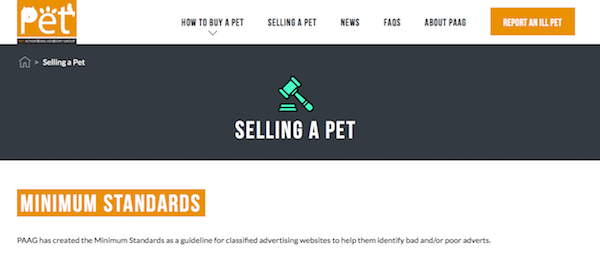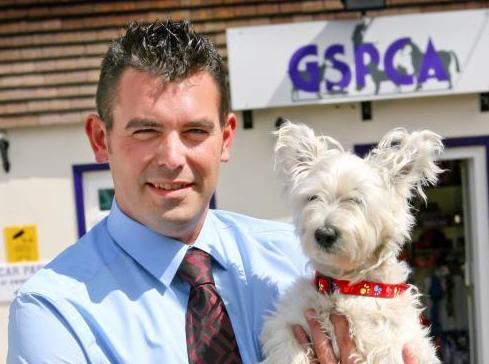

Ahead of Christmas, you may have seen some pets for sale on social media but a 'paw'tential warning about puppy farms in Guernsey has a dif'fur'rent ending to the one we had envisaged.
Express was alerted to a number of puppies for sale on Facebook last week, but a quick chin'wag'with the States Vet and charities Animal Aid and the GSPCA confirmed all was above board and that the Labradors are well happy and healthy and have been rehomed already.
While David Chamberlain was unable to speak about the specific case he said everything was being dealt with correctly and that Animal Aid had also been in touch with the man selling the dogs, with the charity confirming it then helped to rehome the litter.
Sue Vidamour from the charity said she's "delighted with where they've gone," and that all of the dogs are staying on island and have gone to good, approved homes.
She said "it is harder to rehome puppies than an adult dog, because with an adult dog what you see is what you, as they're already grown but with a puppy you don't know. They need training and companionship and that's a lot of time. They need a lot of attention and it's harder."
While Ms Vidamour and Mr Chamberlain are both happy with that situation, the States Vet also wanted to warn potential pet owners about the dangers of buying a pet they see online.
Mr Chamberlain again said he was satisfied with the situation in Guernsey last week but that the Pet Advertising Advisory Group (PAAG) was created in 2001 to combat growing concerns amongst animal welfare organisations regarding unethical classified advertising of pets.
He said, "we also need to be careful not to condemn the internet. Unscrupulous breeders or traders could just as easily advertise in a newspaper, journal or other media. It is not the medium of advertising it is the intentions of the person placing the advert. However it is the popularity, ease of advertising and low cost of advertising that attract vendors to the internet.
"The PAAG’s strategy is to educate and inform the public about the online pet sales environment and it has created minimum standards as a guideline for classified advertising websites to help them identify bad and/or poor adverts (paag.org.uk/selling-a-pet/)."

Pictured: The PAAG website.
Mr Chamberlain said the minimum standards advised by the PAAG are "only one element of a much wider project. We have to ensure that consumers know what to look for and are aware of the best practice guidelines when looking for a pet online, or elsewhere. Informed consumers will be a powerful force in driving up standards of pet advertising and sale across the board.
"I would always advise a potential purchaser to research the vendor, visit the bitch and pups and look for supporting documentary evidence that the vendor was legitimate; ask to see old vaccination documents for the bitch, photos of the pups as they’ve grown up, worming schedules from their vets, Kennel Club and British Veterinary Association (KC/BVA) health scheme certificates, KC registration documents etc."
Mr Chamberlain's comments were also echoed by the GSPCA, with manager Steve Byrne advising that his staff and volunteers will always pass any information on to its Welfare team. On this occasion they had also been informed about the puppies and had alerted the States Vet.
Mr Byrne said the GSPCA "would always stress the need to be extremely cautious when purchasing any animal online due to the scams, dangers and welfare issues that can be caused.
"Following the fantastic advice from PAAG is a must in anyone looking for a pet online as we have seen first hand the illegal movements of puppies from Slovakia to the UK and work with many charities that deal with many sad outcomes on a daily basis due to unscrupulous individuals. We also have some great advice online."

Pictured: Steve Byrne. Read the GSPCA advice on rehoming puppies here.
Mr Byrne also said that there are many dogs in need of homes through charities like the GSPCA so he would urge anyone considering adopting a dog to "look to help those most in need."
"The Shelter frequently has a number of dogs available for re-homing," he said. "Before you will be able to discuss any of the dogs, we request that you fill in an application form that will give us an idea of what your home environment is like. This will enable us to match you up with the right dog. It is our responsibility to both the animal and to you to ensure that we responsibly re-home our dogs. We want to find a situation that results in both parties enjoying a long and happy relationship."
The GSPCA website states that when re-homing a dog each individual situation is considered on it’s own merits, however there are some guidelines that must be adhered to.
You can read all of the advice and guidelines here.
Pictured top: One of the recently rehomed puppies.
Comments
Comments on this story express the views of the commentator only, not Bailiwick Publishing. We are unable to guarantee the accuracy of any of those comments.